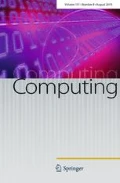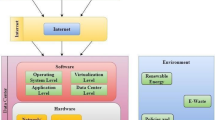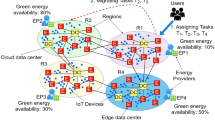Abstract
The rapid evolution of smart services and Internet of Things devices accessing cloud data centers can lead to network congestion and increased latency. Fog computing, focusing on ubiquitously connected heterogeneous devices, addresses latency and privacy requirements of workflows executing at the network edge. However, allocating resources in this paradigm is challenging due to the complex and strict Quality of Service constraints. Moreover, simultaneously optimizing conflicting objectives, e.g., energy consumption and workflow makespan increases the complexity of the scheduling process. We investigate workflow scheduling in fog–cloud environments to provide an energy-efficient task schedule within acceptable application completion times. We introduce a scheduling algorithm, Energy Makespan Multi-Objective Optimization, that works in two phases. First, it models the problem as a multi-objective optimization problem and computes a tradeoff between conflicting objectives while allocating fog and cloud resources, and schedules latency-sensitive tasks (with lower computational requirements) to fog resources and computationally complex tasks (with low latency requirements) on cloud resources. We adapt the Deadline-Aware stepwise Frequency Scaling approach to further reduce energy consumption by utilizing unused time slots between two already scheduled tasks on a single node. Our evaluation using synthesized and real-world applications shows that our approach reduces energy consumption, up to 50%, as compared to existing approaches with minimal impact on completion times.




















Similar content being viewed by others
References
Aazam M, Zeadally S, Harras KA (2018) Offloading in fog computing for IOT: review, enabling technologies, and research opportunities. Future Gener Comput Syst 87:278–289
Agarwal S, Yadav S, Yadav AK (2016) An efficient architecture and algorithm for resource provisioning in fog computing. Int J Inf Eng Electron Bus 8(1):48
Ahmad SG, Liew CS, Rafique MM, Munir EU (2017) Optimization of data-intensive workflows in stream-based data processing models. J Supercomput 73(9):3901–3923
Alkhanak EN, Lee SP (2018) A hyper-heuristic cost optimisation approach for scientific workflow scheduling in cloud computing. Future Gener Comput Syst 86:480–506
Almi’ani K, Lee YC, Mans B (2018) On efficient resource use for scientific workflows in clouds. Comput Netw 146:232–242
Arabnejad H, Barbosa JG (2013) List scheduling algorithm for heterogeneous systems by an optimistic cost table. IEEE Trans Parallel Distrib Syst 25(3):682–694
Basu S, Karuppiah M, Selvakumar K, Li KC, Islam SH, Hassan MM, Bhuiyan MZA (2018) An intelligent/cognitive model of task scheduling for IOT applications in cloud computing environment. Future Gener Comput Syst 88:254–261
Bittencourt L, Immich R, Sakellariou R, Fonseca N, Madeira E, Curado M, Villas L, da Silva L, Lee C, Rana O (2018) The internet of things, fog and cloud continuum: Integration and challenges. Internet of Things 3:134–155
Chiang M, Zhang T (2016) Fog and IOT: an overview of research opportunities. IEEE Internet Things J 3(6):854–864
Deng R, Lu R, Lai C, Luan TH, Liang H (2016) Optimal workload allocation in fog–cloud computing toward balanced delay and power consumption. IEEE Internet Things J 3(6):1171–1181
Duan H, Chen C, Min G, Wu Y (2017) Energy-aware scheduling of virtual machines in heterogeneous cloud computing systems. Future Gener Comput Syst 74:142–150
Fu JS, Liu Y, Chao HC, Bhargava BK, Zhang ZJ (2018) Secure data storage and searching for industrial IOT by integrating fog computing and cloud computing. IEEE Trans Ind Inf 14(10):4519–4528
Gia TN, Jiang M, Sarker VK, Rahmani AM, Westerlund T, Liljeberg P, Tenhunen H (2017) Low-cost fog-assisted health-care iot system with energy-efficient sensor nodes. In: 13th international wireless communications and mobile computing conference (IWCMC). IEEE, pp. 1765–1770
Hosseinioun P, Kheirabadi M, Tabbakh SRK, Ghaemi R (2020) A new energy-aware tasks scheduling approach in fog computing using hybrid meta-heuristic algorithm. J Parallel Distrib Comput 143:88–96
Hu H, Li Z, Hu H, Chen J, Ge J, Li C, Chang V (2018) Multi-objective scheduling for scientific workflow in multicloud environment. J Netw Comput Appl 114:108–122
Ijaz S, Munir EU (2018) Mopt: list-based heuristic for scheduling workflows in cloud environment. J Supercomput 75:1–29
La QD, Ngo MV, Dinh TQ, Quek TQ, Shin H (2018) Enabling intelligence in fog computing to achieve energy and latency reduction. Digit Commun Netw 5:3–9
Lin X, Wang Y, Xie Q, Pedram M (2014) Task scheduling with dynamic voltage and frequency scaling for energy minimization in the mobile cloud computing environment. IEEE Trans Serv Comput 8(2):175–186
Liu L, Qi D, Zhou N (2018) Wu Y (2018) A task scheduling algorithm based on classification mining in fog computing environment. Wirel Commun Mobile Comput 2018:1–11
Mahmoud MM, Rodrigues JJ, Saleem K, Al-Muhtadi J, Kumar N, Korotaev V (2018) Towards energy-aware fog-enabled cloud of things for healthcare. Comput Electr Eng 67:58–69
Mahmud R, Ramamohanarao K, Buyya R (2018) Latency-aware application module management for fog computing environments. ACM Trans Internet Technol (TOIT) 19(1):9
Masdari M, ValiKardan S, Shahi Z, Azar SI (2016) Towards workflow scheduling in cloud computing: a comprehensive analysis. J Netw Comput Appl 66:64–82
Mukherjee M, Shu L, Wang D (2018) Survey of fog computing: fundamental, network applications, and research challenges. IEEE Commun Surv Tutor 20(3):1826–1857
Naha RK, Garg S, Georgakopoulos D, Jayaraman PP, Gao L, Xiang Y, Ranjan R (2018) Fog computing: survey of trends, architectures, requirements, and research directions. IEEE Access 6:47980–48009
Naranjo PGV, Pooranian Z, Shojafar M, Conti M, Buyya R (2018) Focan: a fog-supported smart city network architecture for management of applications in the internet of everything environments. J Parallel Distrib Comput 132:274–283
Peng L, Dhaini AR, Ho PH (2018) Toward integrated cloud-fog networks for efficient IOT provisioning: key challenges and solutions. Future Gener Comput Syst 88:606–613
Pham XQ, Man ND, Tri NDT, Thai NQ, Huh EN (2017) A cost-and performance-effective approach for task scheduling based on collaboration between cloud and fog computing. Int J Distrib Sens Netw 13(11):1550147717742073
Stavrinides GL, Karatza HD (2018) A hybrid approach to scheduling real-time IOT workflows in fog and cloud environments. Multimed Tools Appl 78:1–17
Stavrinides GL, Karatza HD (2019) An energy-efficient, QOS-aware and cost-effective scheduling approach for real-time workflow applications in cloud computing systems utilizing DVFS and approximate computations. Future Gener Compu Syst 96:216–226
Tang Z, Qi L, Cheng Z, Li K, Khan SU, Li K (2016) An energy-efficient task scheduling algorithm in DVFS-enabled cloud environment. J Grid Comput 14(1):55–74
Topcuoglu H, Hariri S, Wu MY (2002) Performance-effective and low-complexity task scheduling for heterogeneous computing. IEEE Trans Parallel Distrib Syst 13(3):260–274
Tortonesi M, Govoni M, Morelli A, Riberto G, Stefanelli C, Suri N (2019) Taming the IOT data deluge: an innovative information-centric service model for fog computing applications. Future Gener Comput Syst 93:888–902
Tsai CW (2018) Seira: an effective algorithm for IOT resource allocation problem. Comput Commun 119:156–166
Verma A, Kaushal S (2017) A hybrid multi-objective particle swarm optimization for scientific workflow scheduling. Parallel Comput 62:1–19
Wan J, Chen B, Wang S, Xia M, Li D, Liu C (2018) Fog computing for energy-aware load balancing and scheduling in smart factory. IEEE Trans Ind Inf 14(10):4548–4556
Xie G, Zeng G, Li R, Li K (2017) Energy-aware processor merging algorithms for deadline constrained parallel applications in heterogeneous cloud computing. IEEE Trans Sustain Comput 2(2):62–75
Yassine A, Singh S, Hossain MS, Muhammad G (2019) IOT big data analytics for smart homes with fog and cloud computing. Future Gener Comput Syst 91:563–573
Zeng D, Gu L, Guo S, Cheng Z, Yu S (2016) Joint optimization of task scheduling and image placement in fog computing supported software-defined embedded system. IEEE Trans Comput 65(12):3702–3712
Zhang L, Li K, Li C, Li K (2017) Bi-objective workflow scheduling of the energy consumption and reliability in heterogeneous computing systems. Inf Sci 379:241–256
Zhou X, Zhang G, Sun J, Zhou J, Wei T, Hu S (2019) Minimizing cost and makespan for workflow scheduling in cloud using fuzzy dominance sort based heft. Future Gener Comput Syst 93:278–289
Author information
Authors and Affiliations
Corresponding author
Additional information
Publisher's Note
Springer Nature remains neutral with regard to jurisdictional claims in published maps and institutional affiliations.
Rights and permissions
About this article
Cite this article
Ijaz, S., Munir, E.U., Ahmad, S.G. et al. Energy-makespan optimization of workflow scheduling in fog–cloud computing. Computing 103, 2033–2059 (2021). https://doi.org/10.1007/s00607-021-00930-0
Received:
Accepted:
Published:
Issue Date:
DOI: https://doi.org/10.1007/s00607-021-00930-0




